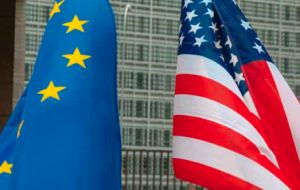MercoPress. South Atlantic News Agency
Obama suggests a transatlantic trade pact would cut Europe' dependency on Russian energy
 EU wants access to US natural gas, but is reluctant to support fracking in the continent
EU wants access to US natural gas, but is reluctant to support fracking in the continent US President Barack Obama has told the European Union it cannot rely on the United States alone to reduce its dependency on Russian energy, as relations with Moscow chill over its seizure of Crimea from Ukraine.
Speaking on a visit to Brussels to discuss trade relations and the Ukraine crisis, Obama said concluding a new transatlantic trade pact, now under negotiation, would make it easier for Washington to license more gas exports.
The EU relies on Russia for about a third of its oil and gas, and tensions with Moscow have heightened concerns among its 28 members about the security of their energy supplies. Some 40% of that gas is shipped through Ukraine.
They have already stepped up efforts to reduce reliance on Russia but German Chancellor Angela Merkel said she supported asking Obama to relax restrictions on exports of US gas.
“Once we have a trade agreement in place, export licenses for projects for liquefied natural gas destined to Europe would be much easier, something that is obviously relevant in today's geopolitical environment,” Obama told a news conference after meeting EU leaders, adding that it could not happen overnight.
During a 65-minute lunch, European Council President Herman Van Rompuy and European Commission President Jose Manuel Barroso pressed Obama to step up US gas exports, but he responded bluntly in telling the Europeans they needed to take politically difficult steps to develop their own resources.
EU ambassador to Washington Jose Vale de Almeida quoted Obama as telling them: “You cannot just rely on other people's energy, even if it has some costs, some downside,” in a clear reference to opposition in parts of the EU on environmental grounds to nuclear power and the extraction of shale gas.
The United States is well on its way to becoming self-sufficient in energy and reducing its industrial production costs because it has allowed large scale use of controversial fracking techniques to tap shale gas.
France and Bulgaria ban fracking and other EU countries such as Britain and Poland face protests.
In the wake of the worst financial crisis since the Great Depression, EU governments and the Obama administration see a deep and broad free-trade deal as the best way to create jobs, removing burdens and customs duties on businesses.
But eight months into the talks, public hostility has grown towards the idea of unfettered transatlantic commerce, while negotiators remain far apart on many issues.
Obama said he had campaigned all his career for consumer rights and environmental protection and would not be party to an agreement that lowered standards. Protesters were reacting to distorted rumors around the trade talks, he said.
In both the United States and Europe, unions worry about job losses or reductions in working standards, and say a trade pact will serve the interests only of multinational companies.
The European Union and the United States already trade almost 3 billion in goods and services each day and, by intensifying economic ties, the pact could create a market of 800 million people where business could be done freely.
Politicians on both sides say a trade pact encompassing almost half the world's economy could generate 100 billion in additional economic output a year on both sides of the Atlantic and set the standards for global business before China does.
Inside the negotiating rooms, other difficult issues include removing customs duties that cost companies billions of dollars each year, particularly automakers such as Ford and Volkswagen.
Washington and Brussels have been at odds over an initial exchange of offers to open up markets and cut tariffs, with each saying the other has not been ambitious enough.




Top Comments
Disclaimer & comment rules-

-

-

Read all comments”quoted Obama as telling them: “You cannot just rely on other people's energy, even if it has some costs, some downside,”
Mar 26th, 2014 - 11:59 pm 0Great comment Obuma....
...and just where has the US been getting it's oil from....and for how long...?
Europe dependent on Russian energy, or Europe dependent on US energy...?
Mar 27th, 2014 - 05:59 am 0Europe should cut the energy consumption and be more... independent...
Stevie, Europe is no longer independent since 1492 BC. I can not see a promising future for Europe.
Mar 27th, 2014 - 07:45 am 0Commenting for this story is now closed.
If you have a Facebook account, become a fan and comment on our Facebook Page!